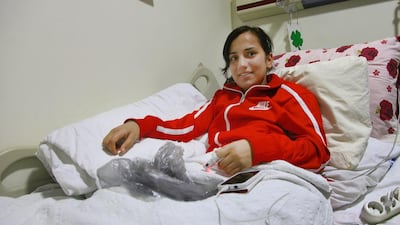GAZIANTEP, TURKEY // Sehriban Sertkal, 19, lies in hospital after being shot three times during clashes that erupted at Kurdish protests against Turkey’s perceived inaction over the ISIL assault on Kobani.
Sehriban, who is deaf, was shot as a nationalist mob fought with Kurdistan Workers Party (PKK) sympathisers as she walked home after visiting a friend that evening.
Doctors fear she may never walk again.
“I came out of the house and found myself in the middle of this protest. I saw men waving knives and then I didn’t see anything,” she said using sign language – her father Tayyip Sertkal translating from her bedside.
Sehriban, a Kurdish high school student, is one of the hundreds injured during demonstrations that turned violent from October 7 to October 10 as tensions about the war across the border turned into violence.
And as the fighting continues in the Syrian town of Kobani, ethnic and political divisions inside Turkey are set to deepen.
The perceived failure by Ankara to do more to help Kobani, a Kurdish-majority town currently being defended by the Syrian Kurdish People’s Protection Units (YPG), ignited the protests that led to the four days of clashes in southern Turkey.
The violence pitted Kurds against Turkish nationalists, the police and Kurdish Islamists, awakening old rivalries.
The fighting “says more about the risks that the country faces”, said Sinan Ulgen, a former Turkish diplomat now at the Carnegie Endowment in Brussels. “It shows to what extent polarising policies can endanger this country’s composite society.”
The night Sehriban was shot, October 9, Kurdish protesters had taken to Gaziantep’s streets for a seventh day chanting “Kobani will be the death of ISIL”. They were met by police and men armed with knives and guns, chaos ensued, with casualties building up both sides, according to witnesses.
Near where Sehriban was shot, the office of the Peace and Democracy Party (BDP), the country’s biggest Kurdish party, was set alight and its sign pockmarked by gunfire.
A leader of the Gaziantep wing of the pro-Kurdish People’s Democratic Party (HDP), Mehmet Karayilan, said the protests drew the world’s attention to Kobani as intended, but the violence had gone too far.
“There was a collection of things we were going to send to Kobani, but they [the nationalists] broke everything and set it on fire.”
News agency videos of the clashes, show men making the sign of the wolf – a Turkish nationalist hand gesture, although the Nationalist Movement Party (MHP) denied any role in the protests.
“We had nothing to do with these people – that sign is made by anyone who wants to express their love for Turkey,” Muhittin Tasdogan, president of MHP’s Gaziantep branch said.
In the south-eastern city of Diyarbakir, the de facto capital of the Kurds 300 kilometres east of Gaziantep, saw the worst of the violence. At least 14 people were killed in fighting that evoked memories of Kurd-on-Kurd violence of the 1990s that pitted the PKK against Turkish Hizbollah.
The PKK supporters revile the Islamist group, which is linked to the Islamist Kurdish party Huda-Par, and accuse it of supporting ISIL.
Bayram Baran, 25, a lawyer from Diyarbakir, said he ran to the BDP-controlled municipality building after he heard it was being attacked. Later his aunt found the bloody body of a 19-year-old in the street, whose death they blame on Huda-Par supporters.
“There is a big war between PKK and Hizbollah – they’re just like ISIL,” he said.
But Seymus Tanrikulu, leader of the Huda-Par Diyarbakir branch, blamed the PKK for inciting the riots that left at least four of his party supporters dead.
“They [PKK] surrounded one building and killed four of our friends.” he said. “We are so sad for Kobani – much more than BDP and PKK. YPG and ISIL are the same for us. Both sides are despots and kill everybody that doesn’t think like them.”
The Diyarbakır police chief, Halit Bogurcu, confirmed after the clashes that five Huda-Par members had been killed, while the other three victims were yet to be identified.
Although the violence has subsided for now, it was an indicator of what could happen should the government’s two-year-long peace process with the Kurds fail, said Mr Ulgen, the analyst and former Turkish diplomat.
The exact terms of a possible final deal have been kept secret, but the Kurds are expected to get greater autonomy in the south-east region where they are a majority and in return for the PKK renouncing violence against the Turkish state.
That may be a difficult pill for nationalist Turks to swallow.
“The Turkish government needs to prepare Turkish public opinion for this settlement with the Kurds. We don’t know what it will look like yet and it may have to be framed as national decentralisation and reform, rather than Kurdish autonomy,” Mr Ulgen said.
Ahmet Davutoglu, the prime minister, used the protests to highlight the peace efforts, saying last week that a deal could be reached “within five or six months”.
But, following the latest violence, such reassurances do little to ease the fear felt by Tayyip Sertkal and his family.
“I was locked up for four months for working with the BDP, they imprisoned my son for three and a half years when he was just 13 years old and now my daughter who can’t even hear has been shot and won’t be able to walk.”
foreign.desk@thenational.ae

